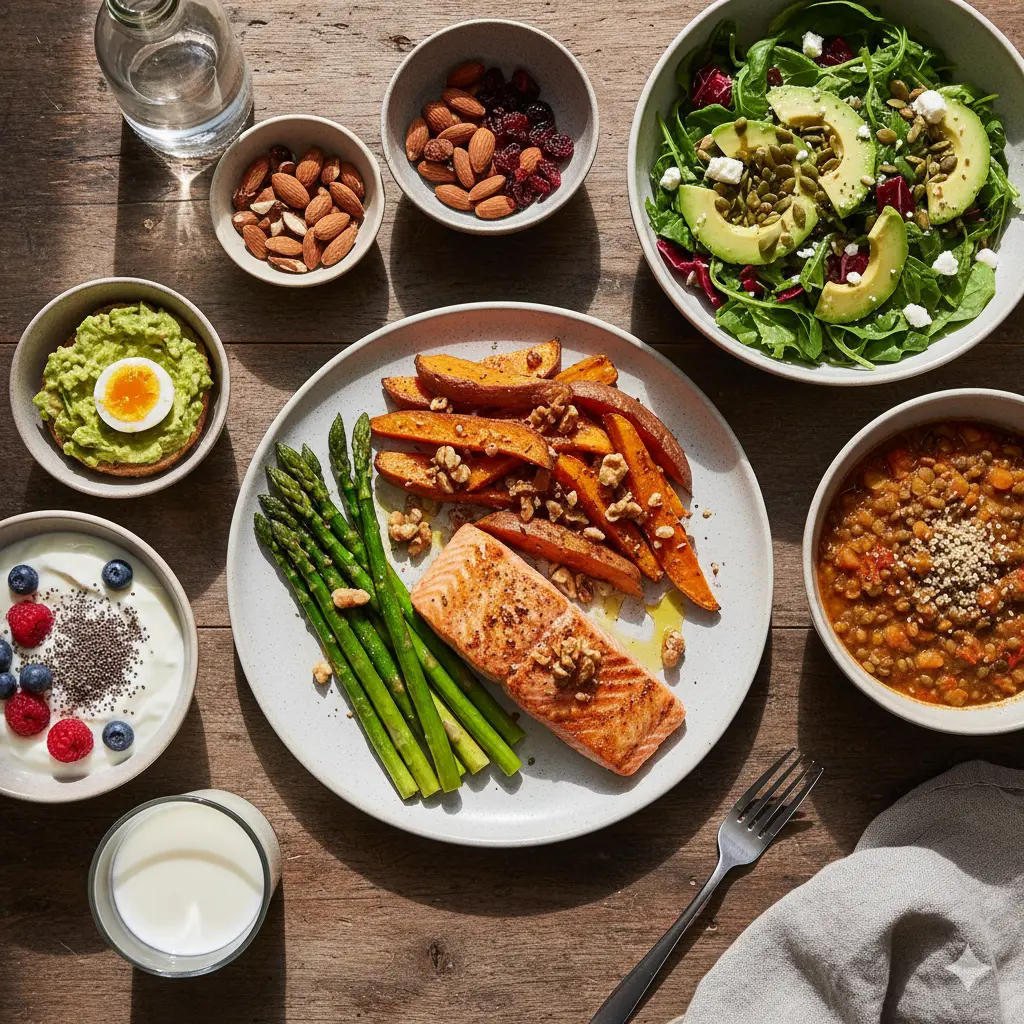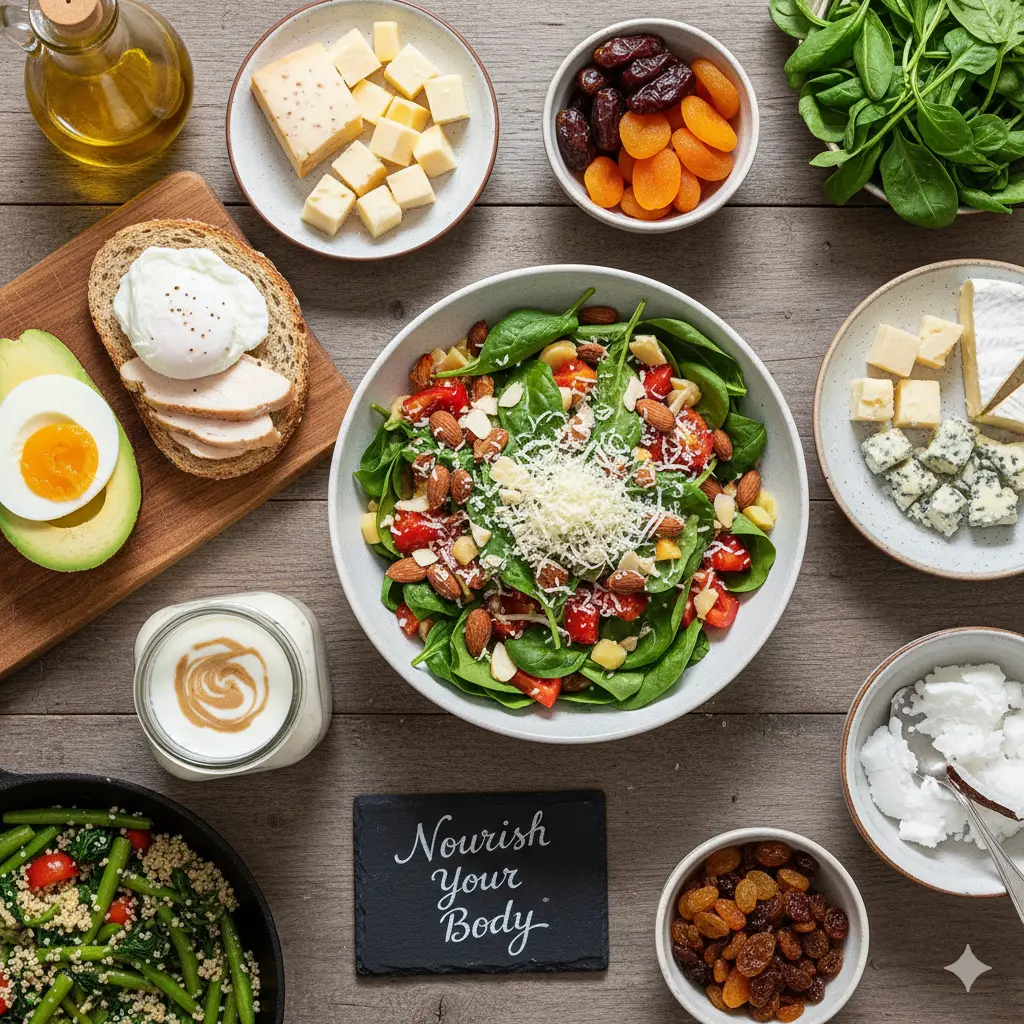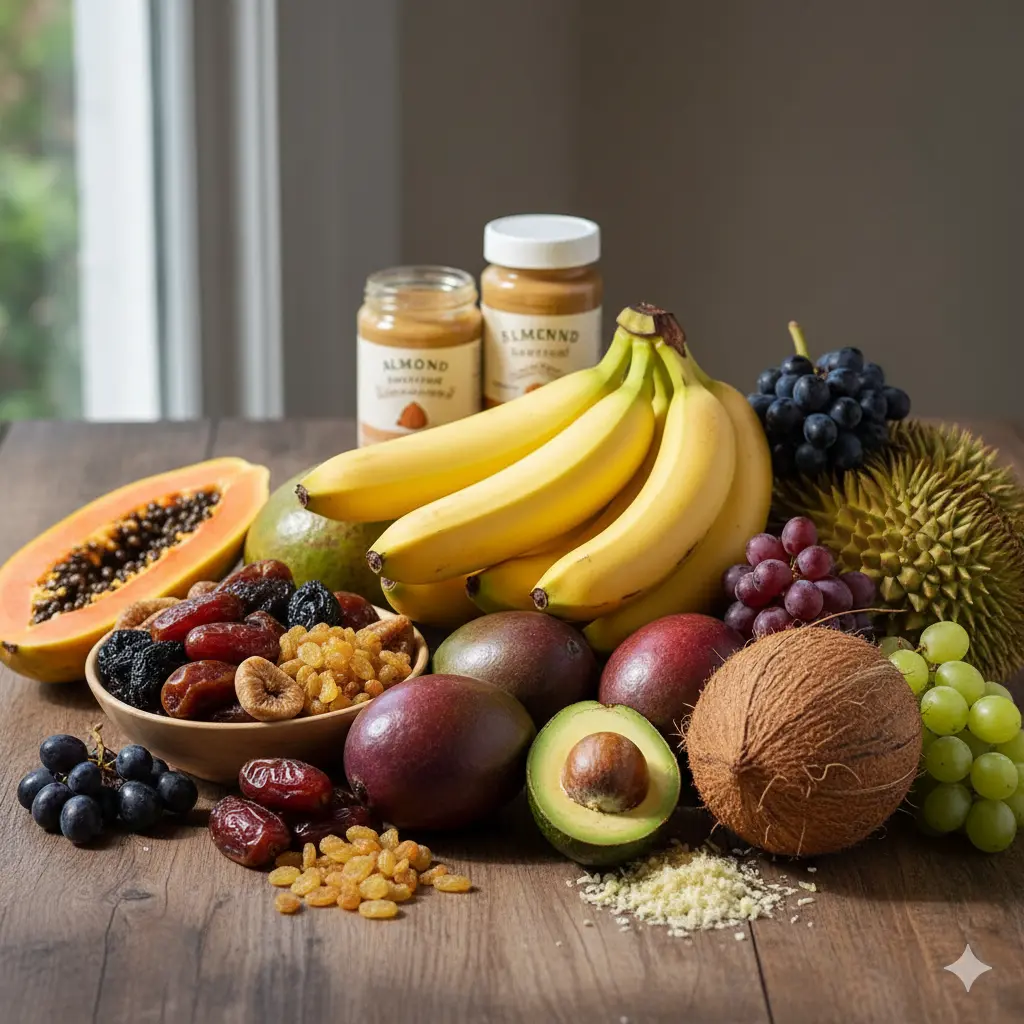Weight Gain: Effective and Healthy Ways to Increase Your Mass
Most of the time, wellness advice focuses on losing weight, but what about those who need to gain it?
Gaining weight might sound like a magic trick; just eat more. It’s not that simple for different people.
One of you wanted to add a few healthy pounds and ended up frustrated; you are not alone in this. It is often suggested to add protein shakes to your diet, but building mass safely is more than that.
Nourishing your body with the right nutrients through balanced and mindful eating actually matters the most. How to gain weight in healthy ways is crucial. Eating junk food or doing strength training is not all.
Developing a plan that strengthens your body from the inside out is the actual meaning of healthy weight gain. Nutrient-rich meals, muscle-building workouts, and smart lifestyle choices can increase your mass in a balanced and sustainable way.


Introduction
Gaining weight is not as simple as “just eat more food” or piling on numbers on a scale. It’s about building a healthier and stronger version of yourself.
For people with fast metabolisms or active lifestyles, gaining weight is frustrating. The good news? Whether you’re naturally slim, recovering from an illness, or trying intense workouts, adding mass requires a balanced approach.
A right nutrition plan with the right training routine can help add healthy weight. Instead of loading up your stomach with calories and excessive junk food, adopt a structured approach with protein-rich meals, calories from whole foods, and strength workouts.
These methods will not only add muscle but will also improve bone density and metabolic health.
Research shows that resistance exercise and adequate protein intake are most effective for lean weight gain.
So, if you’re ready to put on healthy mass that complements your energy, confidence, and long-term fitness goals, let’s break down the most effective strategies together.
Why is it important to maintain a healthy weight?
Maintaining a healthy weight is essential so we can stay healthier without the risk of many serious health problems.
These health problems can affect the heart and overall well-being. A healthy weight supports our energy levels, and we are able to function well in our daily lives. Excess of everything is bad; carrying excess weight can increase the chances of diseases.
You may face diabetes, high cholesterol, high blood pressure, and sleep apnea, which can result in strain on the cardiovascular system. Maintaining a healthy weight helps with all these issues.
- A healthy weight supports joint functioning and reduces the chances of osteoarthritis and other joint issues later in life.
- A healthy weight helps in the regulation of blood and sugar levels and reduces the strain on the heart and arteries.
- It can help with fertility problems and reduce pregnancy complications for women.
- A healthy weight results in a balanced life, thus contributing to better energy levels, improved mood.
- Overweight and underweight are conditions that can weaken the immune system, and recovery from illness becomes too long.
- Jack LaLanne said, “Exercise is king; nutrition is queen. Put them together, and you’ve got a kingdom.”
This is how the power of combined healthy eating with physical activity works.
What are the common misconceptions about weight gain?
Weight gain is not about eating too much and not doing enough exercise, or not doing any at all. People believe the only way to gain weight is simply overeating and being inactive all day long.
The reality is far from this misconception, as experts say weight gain is about nutritional food, hormonal balance, metabolic functionality, and lifestyle correlation.
In weight gain, different factors play a role, including genetics, hormones, stress, and sleep quality. It is more crucial to understand these elements than just overeating habits.
There are a lot of misconceptions about weight gain, including
- Weight gain is solely about eating and not doing exercise, but in reality, metabolism, hormones, muscle mass, sleep quality, and lifestyle are all factors that play a role in weight gain.
- Consuming protein can make you more muscles, but in reality, Protein is essential for muscle growth, and without proper training and calorie intake, it can't make any difference.
- Fat consumption can cause weight gain, but in reality, eating healthy fats like nuts and fruits can lead to sustainable weight gain.
- Eating late at night causes weight gain, but the timing of meals is less important than calorie intake.
- Your weight gain is caused because of poor lifestyle choices, but genetics, hormonal issues, medical conditions, including hypothyroidism, and stress can cause weight gain despite unhealthy habits.
- Supplements can result in weight gain, but protein shakes can support you in healthy weight gain. Nutrient-rich diet with supplements can help in maintaing a healthy weight.
- Pro Tip: Listen to your body's hunger cues and choose nutritious snacks, and it will help you maintain your weight regardless of hours.
What are the reasons for the lack of weight gain?
Some people struggle to gain weight, and one of the key reasons behind this is genetics. Few people have a fast metabolism naturally or a lean body type. It is actually passed down through their family line. It makes them harder to gain weight even if they eat well. Think of something like this: some people burn calories much faster, and it feels like their bodies are tiny furnaces working overtime. Consistently.
Here is the list of a few reasons for the lack of weight gain.
- Some people have a low body mass index (BMI) naturally. This can be inheritance, family traits, or physical activity.
- High metabolic rate burns can also be the reason that prevents weight gain, even with a higher amount of food intake.
- The people who are physically active and do physically demanding jobs burn too many calories, which prevents weight gain.
- Chronic diseases, including cancer, diabetes, thyroid disorders, and digestive diseases, can reduce appetite and cause weight loss naturally.
- People with mental illness or issues such as depression, anxiety, eating disorders, and obsessive-compulsive disorder also have irregular eating behaviors, and this affects their appetite.
- Not consuming the needed calories can also result in a lack of weight gain.
- Overexercising without a proper diet can also lead to the causes of lack of weight gain.
- Pro Tip: A high metabolism rate may prevent you from gaining weight even when eating high-energy foods.
What are the Safe, effective, and sustainable weight gain strategies?
Safe weight gain is about adding nutritional quality and avoiding harmful or extreme methods. Increasing calorie intake with foods with nutritional value supports health and overall well-being without putting strain on the body.
For instance, you can add high amounts of proteins, healthy fats, and carbohydrates instead of adding unhealthy calories like sugary snacks or junk food.
A few approaches can help you gain weight without negative consequences and work effectively if you maintain it for the time being.
- Increase Caloric intake. Aim for an additional 300-1000 calories per day, depending on how much weight you want to put on.
- Consume nutrient-rich foods instead of soda and snacks because Nutrient-Dense Foods will help you build muscle and gain strength.
- Eat balanced foods more frequently. Eat 5 to 7 smaller meals and healthy snacks per day. You can add protein, healthy fats, and carbohydrates through these meals.
- Avoid filling up your stomach with water beacuse it is low low-calorie drink and minimize the calorie intake.
- Add nuts, nut butters, avocado, cheese, oils, dried fruits, and shakes to increase the calorie intake.
- Increase your calorie intake with strength and muscle-building training. It will help you grow muscles instead of just adding fat.
- Avoid harmful habits, including smoking and high sugar consumption, because they can lead to harmful results.
- Get enough sleep because it helps in muscle recovery and growth.
- Pro Tip: Choose nutrient-rich foods as often as possible to gain healthy weight.
What are the basics of calorie surplus and macronutrients in weight gain?
A calorie surplus is core, and it means consuming more calories than your body burns daily. For instance, see your body as a car. The fuel is calories; it must exceed what you use driving around to get more energy stored.
The extra energy is what your body can use to build muscle and can store as fat. A calorie surplus is crucial for muscle growth and weight gain because this is the energy that is required for tissue repair and growth.
The right balance of calories helps in weight gain in a healthier way.
- The calorie surplus should come from nutritional foods, including lean proteins, carbohydrates, healthy fats, and vegetables.
- This can be achieved by reducing physical activity and increasing calorie intake.
- Micronutrients are proteins, carbohydrates, and fats, and all these play an important role in weight gain as well as overall health.
- Protein supports muscle growth and is required for the proper functioning of the body.
- Carbohydrates are the source of energy and are made up after the protein and fat needs are met.
- Healthy fats are important for hormonal balance, satiety, and fat-soluble vitamins.
- Pro Tip: About 250-500 is a recommended moderate surplus of calories per day.
Weight Gain Foods
Nutrient-dense foods for gradual and healthy mass gain
Nutrient-dense foods are a source of calories, as well as vital vitamins. They provide minerals, proteins, and healthy fats.
This combination is crucial for muscle growth and well-being rather than just putting on fat. Healthy weight gain requires a diet plan that is rich in vitamins, minerals, protein, healthy fats, and carbohydrates to support health and muscle growth.
Different foods, including nuts, avocados, and lean meat, are rich sources of energy and nourishment that build mass gradually and sustainably.


- Nutrient-dense foods have a rich amount of vitamins, minerals, protein, and healthy fats; all these combined help in weight gain.
- Nutrient-dense foods provide calories per serving and ensure that the body's needs are fulfilled.
- Consumption of these foods in portions can help you in muscle growth and repair. These nutrients used in balanced diets are crucial for overall health.
- You can gain weight gradually using these foods, and these foods prevent excessive fat accumulation.
- Three main meals and 2-3 snacks of the nutrient-dense meals ensure the steady supply of nutrients and calories
- Pro Tip: Healthy weight gain can be achieved with a proper diet plan that includes nutrient-dense foods. These foods are rich in vitamins, minerals, protein, healthy fats, and complex carbohydrates that help in muscle gain and overall health.
How can you add weight-gain foods to your meals?
There are several practical ways to add weight-gain foods to daily meals, with effective approaches
- Add Calorie-Rich Foods to your everyday meal.
- You can adjust calorie-dense foods such as nuts, dried fruits, cheese, and lean meats into your meals every day.
- You can use a handful of almonds or a sprinkle of grated cheese on top of your salads. These can boost calorie intake without making it heavy for the stomach.
- Consume Healthy Meals and Snacks Throughout the Day.
- Use a protein and healthy fat combination for muscle building You can incorporate avocados into salads, sandwiches, and wraps. You can also blend them into smoothies for a rich, healthy fat source
- Whole milk or full-fat yogurt in shakes, cereals, or smoothies boosts the protein, fat, and calories.
- Whole-grain breads with protein-rich options like eggs, meat, cheese, or spreads can increase your calorie and carbohydrate intake.
- Utilize dried fruits, including dates, raisins, or apricots, for snacks. These are good for a natural sugar and calorie boost.
- Include cheese in salads, omelettes, sandwiches, or as a snack itself to increase fat and protein.
- For portable, calorie-rich options, consume homemade protein smoothies with fruits, milk, yogurt, and nut butter.
- For extra calories, use healthy oils such as olive oil or coconut oil. You can sautée vegetables, cook grains, salads, and dips.
- Pro Tip: Let food be thy medicine and medicine be thy food.


Weight Gain Fruits
Why are fruits important to add to in diet while gaining weight?
Fruits are a surprisingly powerful source of healthy weight gain because they are natural sources of calories, essential nutrients, antioxidants.
Fruits, including bananas, mangoes, and avocados, are calorie-dense, and they contain enough meaningful energy. Daily intake of such fruits packed with fiber and carbohydrates provides calories. The fruit not only helps with weight gain but also supports overall health.
- Fruits are a natural source of sugars and carbohydrates and help in weight gain.
- Fruits add nutrient density and increase the calories without unhealthy junk foods, and make the weight gain process healthier.
- Fruits with sources of protein and fats support sustained energy and help in maintaining sugar levels.
- Fruits are the source of vitamins, minerals, and fiber that help in digestion during weight gain.
- Pro Tip: Adding fruits to your diet helps regulate your appetite and contributes to a balanced diet.
What are the best weight-gain fruits to add to your diet?
Adding fruits to your diet especially those high-calorie fruits is a smart way to gain weight in a natural way without consuming junk food.
- Fresh fruits are effective for healthy weight gain because of their natural sugars and other nutritional values.
- One of the best fruits for weight gain is Bananas. Bananas are rich in carbohydrates, calories, and nutrients like vitamin B6 and manganese. A medium banana provides 105 calories per serving. The starch in bananas supports gut health.
- Avocados are a rich and healthy fat fruit. An Avocado provides 161 calories per half serving.
- Avocados are best for mass increase with essential vitamins and minerals.
- Mangoes are a rich source of carbohydrates and calories. They are a rich source of natural sugar. A medium mango provides 99 calories per serving. They boost the fiber, aid energy, and calorie intake.
- High-calorie-count fruit dates provide calories of 277 calories per 100 grams. Dates are also a source of natural sugars and fibers. These are the best nutritional sources for weight gain.
- Sapota (chikku) is also a source of a moderate calorie boost with sugars and fibers. It helps with digestion.
- Other calorie-dense fruits like raisins, figs, papaya, and dried apricots are also best for weight gain.


Weight Gain Vegetables
What is the role of vegetables in gaining weight?
Vegetables, especially starchy ones, including sweet potatoes, peas, and corn, are allies for weight gain. Vegetables play a role in weight gain as they provide slow-digestion of carbohydrates, essential vitamins, minerals, and fiber. They help in muscle growth, energy regulation, and overall cellular repair.
- Vegetables, including sweet potatoes, green peas, corn, beets, and carrots, are calorie-dense and rich in nutrients, and they boost calorie intake.
- Vegetables are also a source of vital nutrients, including beta-carotene, potassium, iron, magnesium, and antioxidants. These vitals help in metabolic health and muscle functioning.
- Starchy vegetables increase glycogen stores in muscles. They provide sustained energy and help in muscle mass development.
- Vegetables help in a balanced diet and regulate digestion. Vegetables also prevents unhealthy eating and overeating.
- Roasting, steaming, or pairing vegetables with healthy fats can enhance the calorie content.
- Pro Tip: Vegetable intake is associated with a reduced risk of weight gain and overweight or obesity.
What are the best vegetables for mass gain?
Vegetables are crucial for mass gain as they are rich in protein, complex carbohydrates, fiber, vitamins, and minerals. All these elements together support muscle repair and energy metabolism. Some of the best vegetables for building mass include
Broccoli
It is rich in protein, fiber, vitamin C, and K. It aids in collagen production for muscle repair.
Spinach
It is a rich source of protein, iron, calcium, and magnesium. It helps in muscle function and recovery.
Green peas
A rich source of Protein, vitamins, and minerals. They provide iron and support muscle synthesis.
Sweet potatoes and yams
They are low in digestibility and provide calories for sustained energy.
Pumpkin and butternut squash
These are sources of fiber, vitamins, and carbs. They help in muscle growth and repair.
Corn and beets
They provide calories and nutrients that help in muscle growth.
- Pro Tip: Leafy greens, including spinach and kale, help improve strength and muscle performance and boost nitric oxide for better blood flow.
Weight Gain Drinks
What are the best drinks for weight gain?
High-calorie and protein drinks are for short-term weight gain, especially when your appetite is poor. You can make such drinks at home.
- Homemade energy-filled drinks include milk, fresh fruit, yoghurt, honey, sugar, and ice cream. These ingredients together increase the calorie and protein intake.
- Smoothies made of yogurt and milk are more nutritious. Such smoothies provide calories and protein. You can add oats or seeds to your smoothies to add more nutritional value.
- Milkshakes with puréed fruit, fruit yoghurt, or ice cream are energy-dense options
- Hot drinks with skimmed milk powder, to milk-based beverages like hot chocolate, can also help in weight gain.
- High-protein shakes with additional ingredients such as protein, nut butter, and fruits provide 400-600 calories, which aids in muscle mass growth.
- Pro Tip: People with specific dietary needs or conditions should choose drinks with low sugar or carbohydrates with fiber or protein content, with physician recommendations.


How can you add different drinks to your diet?
Calorie-dense and nutritious drinks can be added to your diet using different ingredients such as bananas, eggs, yogurt, avocado, nuts, and protein powders. They can add proteins, healthy fats, and carbohydrates, and make you feel full.
- Use full-cream or whole milk in different beverages, including tea, coffee, or hot chocolate, instead of water. This will boost your calorie intake and add protein.
- Incorporate dairy drinks like kefir to increase the intake of protein and probiotics. It contributes to weight gain.
- Try a variety of nutrient-rich shakes, including chocolate banana nut shakes, vanilla berry shakes, or dates with honey shakes. You can also try customized shakes to your taste and dairy preferences.
- Pro Tip: Smoothies taste good. You can also control the flavour as you like.
Weight Gain Exercises
What are the recommended workouts for muscle gain?
Workouts for muscle gain generally include exercises that engage multiple muscle groups. The isolated movements target specific muscles. Here are a few exercises you can follow for muscle gain.
Squats
A workout for lower body strength includes the target quads, hamstrings, glutes, and core.
Deadlifts
This is a workout for overall muscle building. The usual focus is on core, back, legs, and arms.
Bench Press
This is great for upper-body mass growth. The focus areas of this workout include chest, triceps, and shoulders.
Pull-Ups:
The focus areas of this workout include lats, biceps, and shoulders.
Barbell or Dumbbell Rows
This workout strengthens the back and biceps.
- Pro Tip: Whether you’re sticking to a push-pull-legs, full body exercise, or any high-intensity program, focus on compound exercises because these exercises are most effective for developing mass.
A weekly workout plan
Here is a Weekly Workout Plan that focuses on specific workout days with different muscle groups.
Day
Focus Areas
Exercises
Sets
Monday
Chest and Abs
- You can go with the Barbell Bench Press, Dips
- Weighted Sit-ups
4-5
Tuesday
Legs
- Barbell Squats
- Dumbbell Lunge
- Leg Press
4-5
Wednesday
Cardio
- Treadmill
- Jogging
- Deadlifts
Thursday
Back and Shoulders
- Pull-Ups
- Pulldowns
- Overhead Press
3-5
Friday
Full Body or Repeat
- Squats
- Bench Press
3-5
Saturday
Light Activity
- Light cardio
- Stretching
- yoga
3-5
Sunday
–
Rest
–
What are the best Weight Gain Tips & Habits you can follow?
The best Weight Gain Tips are the practical and effective actions that you can add to your lifestyle to maintain a healthy and sustainable weight.
- Increase Caloric Intake in a way that your body consumes more calories than it burns. Aim for 300-500 additional calories per day.
- Eat More Protein-oriented meals such as meats, fish, eggs, dairy, legumes, nuts, and protein supplements.
- Eat more frequently; you can add 5 to 7 smaller meals a day.
- Utilize nutrient-dense and energy-dense foods, including fruits, vegetables, and healthy oils.
- Adding Calorie-Rich Shakes and Smoothies is easier to consume than solid foods.
- Engage in muscle-building exercises and workouts to build muscle for a particular part of the body.
- Consume homemade foods, shakes, and smoothies more frequently.
- Use healthy oils such as olive or coconut oil to sauté vegetables and to increase the calorie intake.


What are the common mistakes you need to avoid while gaining weight?
Following is the checklist of the Common mistakes you should avoid while gaining weight.
- Avoid Consuming heavy meals in one sitting because it can disturb your stomach, and your body only absorbs a certain amount of nutrition at a time.
- Excessive calories consumed at once are stored as fat. You can consume meals into portions instead of consuming all at once.
- Do not avoid good carbohydrates because they are important for energy and healthy weight gain.
- Don't give up too early because every process takes time, requires patience, and needs consistency.
- Avoiding exercise because it helps in toning muscles.
- Setting unrealistic goals can cause frustration because weight gain depends on a number of factors, so understand your body's needs first and then set goals accordingly.
Final words
Weight gain is not just about adding pounds; it’s all about mindset and a journey with gradual steps that need your consistency.
Healthy weight gain involves one’s body’s needs and smart eating choices with training. Your healthy food choices, including nutritionally dense fruits and vegetables, and muscle-building routine, make a real difference.
You won’t grow until you don’t eat like you’re growing. The final words bring home the idea that weight gain is about lifestyle, with informed choices to love your body.

FAQs
How quickly can I gain weight without exercise?
You can achieve your weight gain without exercise by consuming 700–1,000 calories per day with gradual steps.
Can weight-gain drinks replace meals?
Homemade shakes and protein smoothies can really help you gain weight, but it is not a good practice to replace whole meals regularly with protein shakes or healthy drinks.
What are the best weight gain supplements?
The best weight gain supplements in powder form are whey, soy, pea, creatine, and nutrient-dense shakes. These supplements help in muscle gain and calorie intake.